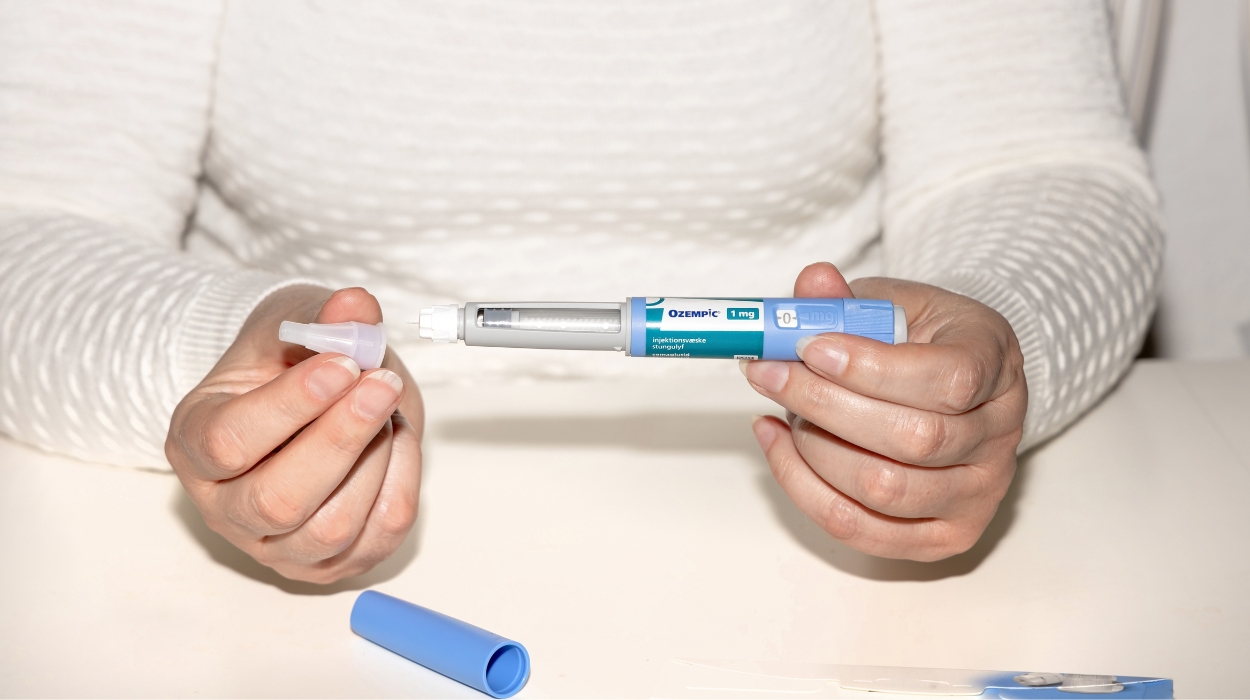There are many health and wellness supplements on the market that claim to help you lose weight and improve your overall health. Ozempic was designed to treat type 2 diabetes, but it may also help with related conditions such as weight issues and obesity. Research[1] suggests that it may also relieve symptoms related to polycystic ovary syndrome, or PCOS. But does it work?
This article will review Ozempic for weight loss related to PCOS so you can determine if you should consider it as a treatment option.
Is Ozempic Good For PCOS And Weight Loss?
Possibly, Ozempic may help with weight loss related to PCOS. It offers the following benefits:
- Blood sugar regulation.
- Androgen hormone reduction.
- Reproductive functioning improvement.
- Heart health support.
- Menstruation regulation.
Ozempic For Weight Loss

Approved by the FDA in 2017, Ozempic is the brand name for the drug semaglutide. It is approved to treat type 2 diabetes and has been shown to help with weight management.
The drug is a glucagon-like peptide-1 receptor agonist, also referred to as a GLP-1 receptor agonist. It stimulates the activity[2] of the appetite-suppressing hormone GLP-1. However, unlike the hormone GLP-1, which lasts for a few hours, it can last up to a week, extending the effect in the body.
Ozempic also regulates blood sugar. This activity is why it is used to treat people with type 2 diabetes.[3] It lowers blood sugar by promoting insulin production. It also slows food down as it moves through the stomach and intestines. As a result, it reduces appetite and decreases the amount of sugar that enters the bloodstream.
Although Ozempic is usually prescribed for type 2 diabetes, some doctors may recommend it for losing weight. The drug is taken once a week via a shot that can be self-administered by the patient.
Does Ozempic Help With PCOS?
Ozempic was not designed to treat PCOS. However, research[4] suggests that it may have a role in relieving symptoms related to PCOS.
PCOS is a health condition that treats women of reproductive age. PCOS symptoms[5] include:
- Irregular menstruation.
- Oily skin.
- Acne.
- Excessive facial and body hair.
- Hair thinning.
- Weight gain, especially in the abdominal area.
PCOS is also often linked to other conditions such as:
- High blood pressure.
- Heart disease.
- High cholesterol.
- Type 2 diabetes.
- Endometrial cancer, which affects the uterus.
The exact cause for PCOS is not well understood. However, it is more likely to occur in[6] people with a family history of the condition and those with type 2 diabetes. It is a chronic condition that is not curable, but it can be managed.
Is Ozempic good for PCOS? A 2017 review suggested that GLP-1 receptor agonists can help reduce PCOS symptoms[7] in obese women. They discuss how GLP-1 may help reduce weight, which can lead to a reduction in symptoms.
How Does Ozempic Work For PCOS?

In this section, we’ll review why Ozempic may relieve PCOS symptoms.
Weight loss and blood sugar regulation are important for the management of PCOS. Losing weight may improve PCOS symptoms.[8]
- Improve reproductive health and functioning.
- Reduce levels of androgens or male sex hormones.
- Lower blood pressure.
- Decrease bad cholesterol levels.
- Increase blood sugar regulation.
Ozempic may also improve insulin resistance,[9] a condition common to people with PCOS.
Insulin resistance occurs when the body produces insulin, but the body doesn’t respond to the insulin. Insulin tells the body to remove sugar from the bloodstream. Individuals with insulin resistance will likely have high blood sugar levels. The blood sugar can be converted and stored in the body as fat cells, which may increase the risk of obesity.
Ozempic helps with blood sugar regulation.[10] It also reduces the risk of obesity,[11] which can lead to health complications. People with PCOS are often prescribed metformin to help keep their blood sugar under control. Recent research also shows that Ozempic may be an alternative for metformin.[12]
What Are Ozempic’s Side Effects?
Ozempic is only FDA-approved for people who have type 2 diabetes. Some doctors may prescribe it to patients for weight loss. However, it increases the risk of lowering blood sugar to dangerously low levels in people without diabetes.
It is currently unclear how Ozempic affects women who are pregnant, breastfeeding, or trying to conceive. Additionally, there is also a growing concern about the high demand for the drug. Its popularity for weight loss may lead to shortages, meaning people who need it to treat more severe conditions such as type 2 diabetes may be unable to access it.
The drug has also been shown to cause the following side effects:
- Nausea.
- Vomiting.
- Diarrhea.
- Abdominal pain.
More serious side effects include:
- Allergic reactions.
- Kidney problems.
- Thyroid cancer.
- Diabetic retinopathy.
- Gallstones.
- Pancreatic swelling.
Patients may also regain weight when they stop taking Ozempic. This happens when they don’t make necessary lifestyle changes, such as eating at a calorie deficit to lose weight.
Other Weight Loss Options
Ozempic may help reduce PCOS symptoms and aid with weight loss. Potential side effects and the high price tag may lead people to try ways to lose weight naturally instead. Fortunately, there are natural methods that aid in weight loss, such as:
- Portion control: During each meal, consider filling the plate with reasonable portions to help avoid gaining weight.
- Drink more water: Research shows that drinking water can help[13] with weight loss. Try to drink water daily to lose weight. Water is a natural appetite suppressant. It is a healthy alternative to sugary drinks. It speeds up the metabolism and helps you optimize your workouts.
- Exercise: Daily exercise will help you reach your weight loss goals. Experts recommend[14] that you exercise 30 minutes a day 5 times a week. A combination of aerobics and weight training can help optimize fitness.
- Get support: It’s not easy to lose weight on your own. Team up with a friend or relative to improve healthy eating and exercise habits. You can hold each other accountable and support each other during times of weakness.
The above options will help you lose weight naturally. There are other more invasive weight loss methods. For example, surgical procedures can help shrink the stomach. These include:
- Bariatric surgery.
- Intragastric balloons.
- Gastric sleeves.
- Gastric bypass.
These surgeries provide additional strategies for weight loss. However, there may be risks for various health complications.[15] They are also expensive. You should only seriously explore and consider surgical options while consulting a licensed medical professional with experience working with patients needing to lose weight.
Weight Loss Options For Women With PCOS
There are also specific options that will help you lose weight fast with PCOS. The natural options above, such as calorie restriction, portion control, exercising, and drinking more water will help people with PCOS keep their weight under control. Other methods to help with weight gain related to PCOS include:
- Intermittent fasting: Intermittent fasting involves eating within a certain window of time and fasting for the rest of the day. This strategy aids with weight loss. It also reduces androgen hormones and insulin production.[16] This can be especially beneficial to women with PCOS.
- Reduce consumption of refined sugar: Refined sugar is processed sugar. The natural ingredients are removed, leaving pure sugar. This is bad for women with PCOS because it can increase weight and insulin resistance. Reducing refined sugar intake may help improve symptoms of PCOS.
- Eat more fiber: Foods that are rich in fiber will help you stay full longer, so you are less likely to snack. Fiber[17] is also beneficial to the heart and the digestive system.
Balancing Hormones Can Help With PCOS Symptoms
Hormonal imbalance and PCOS are intertwined. Balancing hormones can help reduce PCOS symptoms. Here are some suggestions on how to balance hormones:
- Reduce stress: Yoga, meditation, deep breathing, and exercise can help reduce stress and improve hormone balance.
- Eat a healthy diet: Many hormones need to be produced by your body every day from vitamins, minerals, and other nutrients. To ensure your body can keep up with this hormone production demand, it is best to consume a diet that is rich in a variety of fresh fruits, vegetables, meats, and grains. Avoid processed foods if you can, and reduce caffeine, sugar, and alcohol consumption.
- Get the proper amount of sleep: The body produces and regulates hormones during sleep. Try to get 7–9 hours of sleep every night to improve hormone balance. Create a relaxing vibe in the bedroom and follow a sleep routine to ensure you get the rest you need.
- Exercise: Exercise can help increase endorphins, reduce stress, and aid with hormone balance. Exercise regularly to maintain a healthy lifestyle.
- Herbs and supplements: Certain supplements and herbs may improve hormone balance. There is limited research on the use of magnesium,[18] omega-3 fatty acids,[19] ashwagandha,[20] and maca.[21] Be aware that herbs and supplements are not FDA-approved. Do your research or talk with a healthcare professional to ensure you are using the right products to help you reach your health goals.
- Stay away from endocrine disruptors: Endocrine disruptors[22] are chemicals that affect the body’s endocrine system. They can be found in anything from food to cleaning and cosmetic products. They can negatively affect the body’s hormones.[23] Avoid them by eating organic foods and using all-natural homecare and self-care products.
Is Ozempic Approved for PCOS?
Ozempic and other GLP-1 agonists are not FDA-approved to treat PCOS at this time. They are only approved for diabetes treatment and weight management. More research is needed before Ozempic can become FDA-approved for PCOS. However, drug shortages may cause issues with research from moving forward.
However, doctors may prescribe Ozempic to women with PCOS for off-label use. Off-label use is when a drug is prescribed for a condition that it is not FDA-approved for. Experts believe it can decrease the risk of serious PCOS-related conditions occurring.[24]
Conclusion
PCOS is a chronic condition that affects many women. Using Ozempic for weight loss in women with PCOS may help reduce symptoms, and make it more manageable. However, the drug is not approved for treating PCOS at this time. It is also expensive and comes with its share of side effects. Talk with a doctor if you have questions about using Ozempic for managing PCOS. They can help you determine the best course of action.
Frequently Asked Questions
Yes, studies have shown Ozempic may help women with PCOS and related comorbidities. It helps regulate blood sugar,[10] reduce weight, and lower the risk of heart disease.[25]
Various weight loss medications may help reduce PCOS symptoms. The results of medication can be different for each individual. Ozempic is one option since it addresses insulin sensitivity and blood sugar regulation. It helps manage diabetes, which is often linked to PCOS.
Ozempic prices vary depending on where you buy it. It averages around $900 per month. Prescription may be fully or partially covered by insurance.
There is no approved medication for weight loss with PCOS. However, Ozempic may be used off-label for weight loss with PCOS weight loss. It comes in the form of a needle shot which must be administered once a week.
 Evidence Based
Evidence Based
